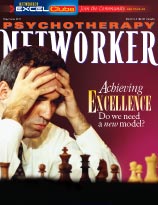
The Psychotherapy Networker has long been the most popular periodical among practicing clinicians. Rumor has it that the magazine has 80,000+ subscribers and sells over 120,000 copies of each issue. If you want to know what therapists are thinking and talking about, the Networker magazine is the place to look. And in the May/June issue, the topic of excellence is front and center.
The reason is obvious: the field of psychotherapy is in trouble. Think about it for a moment. What real accomplishments can psychotherapy boast of in recent years? What was the last truly revolutionary discovery in the field of psychotherapy? What “treatment” (analogous to penicillin in medicine) has ever successfully eradicated a mental or emotional disorder? In fact, while we’ve been at our posts, provisioning and parading an army of techniques and methods, rates of depression and anxiety have soared. Even if one disagrees with this grim assessment of the field’s contributions and influence, it’s hard to be sanguine about our status. Over the last decade, median incomes for psychologists, both applied and academic, have dropped by thousands of dollars. In the same period, workloads have increased, professional autonomy has been subverted, and funding for public behavioral healthcare has all but disappeared. Meanwhile, the very relevance of psychotherapy is an open question in the minds of many current and prospective consumers. Despite overwhelming evidence that therapy works, and that more than 90 percent of people say they’d prefer to talk about their problems than take psychopharmacological drugs, most people doubt the efficacy of treatment. Perhaps this accounts for the fact that the use of medications has steadily increased, while visits to a psychotherapist have been decreasing.
What can be done?
In 2007, we wrote an article that appeared in the pages of the Networker on the subject of “top performing” clinicians–those that consistently achieve superior results with their clients. Over the last four years, we’ve continued to research and write on the subject and in the latest issue of the Networker we review the latest findings. ICCE Associate, Dr. Bob Bertolino, also has an article in the issue detailed the steps required to reac excellence in agencies and healthcare systems.



Scott Miller Mark Hubble Bob Bertolino
Never has a moment in the history of the field existed when the need for a “culture of excellence” has been more pressing or when the qualities of that culture are more unambiguous. Seeing as we spend so much of our lives at work anyway—often more in total than with our families, friends, and in leisure—the question is, “why not?” If not for ourselves, then for our clients, the very people the research shows benefit the most from top performance and on whom our livelihoods depend. Don’t wait. Click on the links above to read both articles.

Leave a Reply